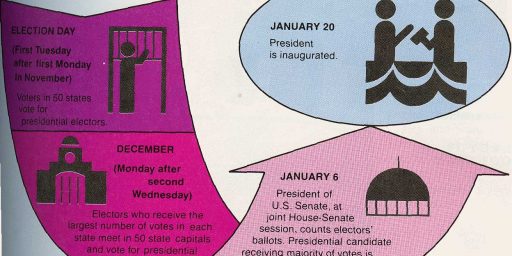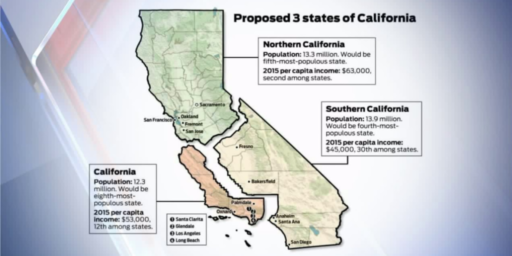Colorado Electoral College Change?
There is a move afoot in Colorado to allocate that state’s nine Electoral College votes via proportional representation.
Kos is excited because it takes a possible nine vote block for Bush and splits it in two. Of course, it also takes a potential Kerry mild upset out of play as well.
I don’t have any heartburn with the proposal per se–Maine and Nebraska do something similar already (they allocate two at large votes to the statewide winner and one vote each to winners in each congressional district)–but the methodology here is somewhat troubling. Not only is the ballot initiative backed by a non-citizen, which is rather odd, but it would change the rules during an election:
If approved Nov. 2, the constitutional amendment would affect this year’s choice for president by immediately permitting the division of Colorado electoral votes.
So, literally, the rules change would take effect after the election.
This is problematic for two reasons. First, one would think this would run afoul of federal law, which requires that each state’s rules be in place before an presidential election. Second, it creates a strong incentive for mischief. If both the national and statewide presidential races are close–which seems likely at the moment–election officials would be motivated to influence the counting of both the ballot initiative and the presidential vote totals. It could conceivably be more messy than Florida 2000.






According to the article, the guy putting up the cash is a U.S. citizen, though apparently he’s not from Colorado.
Actually, this move should HELP Coloradans (Coloradoans?) in the long term. I’ve explained why here.
Has anyone really looked into the Colorado action? According to the Constitution, to win the Presidency someone has to win the majority of electoral votes. If you split the votes by percentage then who would have won in 1992, 1996 or 2000. Remember that in 1992, Perot was a major spoiler and neither candidate won the absolute (50% +) majority of votes….the same in 1996 (Perot) and 2000 (Nader). In that case the legislature would determine the winner. Do we really want almost every election to go to Congress? If this system goes nationwide without a constitutional ammendment to change the 270 electoral votes policy, every election will usually end up out of the people’s hands.
Hey, Jim, you may have just stumbled upon the means of getting people to think seriously about whom they vote into Congress!
Why is a Brazillian Business man even allowed to bankroll this? The electorial College woks as defined and should not be changed. Democrat motto: If you can’t win fairly, rewrite the election laws.
Jim,
Actually, only a couple of the very close elections in our history would have changed using a Maine-Nebraska allocation. I used to have a chart showing that when I taught American Politics. I can’t recall whether Gore would have won 2000 under that system; I don’t think he would have–California and New York’s huge blocks would have been divided.
You’d still have a first-past-the-post system, so minor candidates would still have negligible impact.
James,
Except that Colorado isn’t talking about that sort of system: they want to spread the electoral votes by percentage of votes casts rather then congressional district so it is quite possible that a third party canidate could pick up some of those votes and in a close race enough to bring the election into the House.
Jim,
True if it’s pure PR. I can’t tell from the newspaper story. A lot of systems (Germany’s for example) use a modified PR that has a floor–a threshold of 10% or whatever, so that fringe parties don’t get anything. Plus, we’re talking about the allocation of 9 Electors, so there would have to be a de facto floor of 11.1%, anyway, since the Constitution makes no provision for partial Electors.